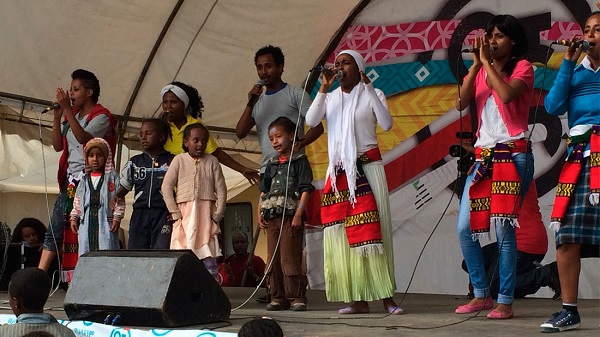
Through songs, radio drama and their own YouTube channel, Yegna champion women’s rights across Ethiopia, where many young women never get the chance to go to secondary school. Last year, the band lost its UK aid funding after a negative press campaign, but they remain determined to press home their message. The Guardian went to Addis Ababa to find them still inspiring young girls to assert their right to education and say no to child marriage
By Claudine Spera (The Guardian)
BAHIR DAR–In the grounds of a school in Bahir Dar, a city in north-west Ethiopia, thousands of young fans have gathered to catch a glimpse of the country’s hottest girl band.
Behind billowing white sheets in a makeshift green room, the four women collectively known as Yegna prepare to take the stage. As the harsh lunchtime sunshine beats down, curious schoolchildren press up against the material to get a glimpse of their idols, who have been dubbed Ethiopia’s Spice Girls by the British press.
More than just a band, Yegna, which means “ours” in Amharic, use music and drama to raise awareness of child marriage, sexual harassment, violence and the importance of education. And it’s making a difference. An estimated 8.5 million people have heard the band’s messages.
Bilen, 14, is at the concert with her sister. “Yegna taught us the motto ‘Yes we can,’” she says. “As we grow up, I think people think less of girls, and that’s what we used to think too. But our perspective has been changed by Yegna.”
But last year, Yegna’s work came under threat when the UK’s Department for International Development, which helped create the band in 2012, abruptly announced it was cutting funding following media criticism. DfID said it took the decision to end its partnership with Girl Effect, which oversees Yegna, after a review of the program.
ALSO: The Yellow Movement: Ethiopian Women Use Valentine’s Day to Promote Girl Power
A spokesperson said: “There are more effective ways to invest UK aid and to deliver even better results for the world’s poorest and value for taxpayers’ money.”
Girl Effect had received an initial DfID grant of £4m for Yegna, covering the period from 2011 to 2015. They were later given a further £5.2m for 2015-18, although the premature conclusion to the partnership meant not all these funds were drawn down.
Read the complete story at The Guardian
